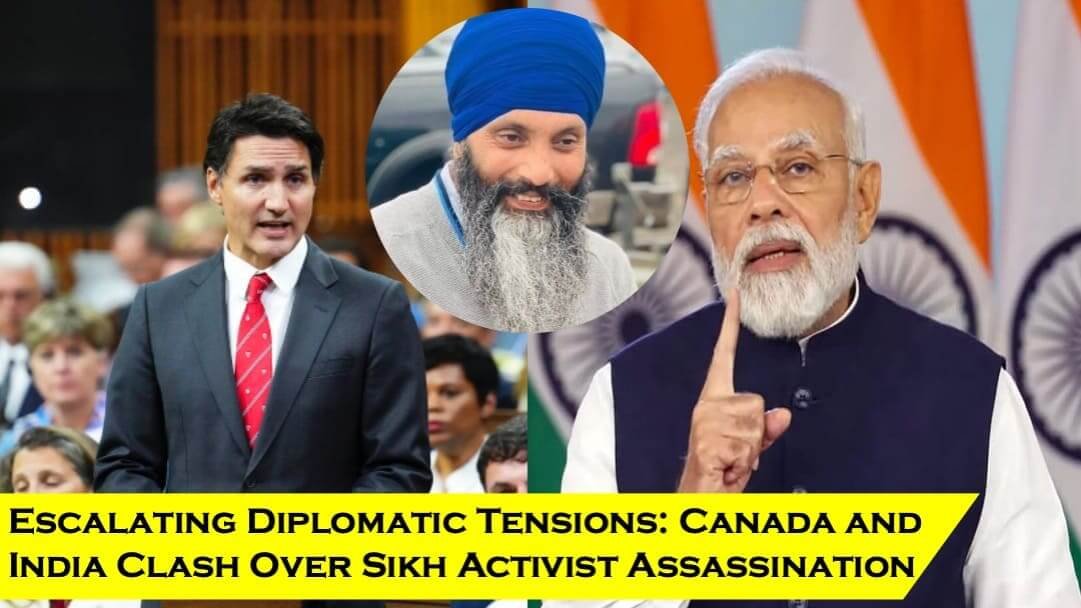Escalating Diplomatic Tensions: Canada and India Clash Over Sikh Activist’s Assassination
Canada’s Accusations and Diplomatic Fallout
The relationship between Canada and India has taken a severe hit as a result of Canada’s accusations that India may have had a hand in the assassination of a Sikh activist on Canadian soil. This crisis has led to both Ottawa and New Delhi expelling senior diplomats, causing significant strains between the two nations.
Canadian Prime Minister Justin Trudeau publicly stated that Canada was actively investigating “credible allegations” linking India to the June murder of Hardeep Singh Nijjar, a Canadian citizen and prominent Sikh leader. Trudeau emphasized his government’s commitment to holding the perpetrators accountable.
Reciprocal Diplomatic Expulsions
In response to Canada’s actions, the Indian government expelled a senior Canadian diplomat based in India. This tit-for-tat exchange of diplomatic expulsions underscores the escalating nature of the dispute.
Mélanie Joly, Canada’s Foreign Affairs Minister, revealed that they had expelled an Indian diplomat, whom she identified as the head of the Indian intelligence agency in Canada. She emphasized Canada’s determination to uncover the truth behind Nijjar’s assassination and communicated Trudeau’s discussions with US President Joe Biden and British Prime Minister Rishi Sunak on this matter.
Hardeep Singh Nijjar’s Assassination
Hardeep Singh Nijjar, a prominent Sikh leader in western Canada, met a tragic end when he was gunned down in his truck in June. The assailants, masked gunmen, targeted him outside a Sikh temple in Surrey, British Columbia. This incident sent shockwaves through Canada’s Sikh community, one of the largest Sikh communities outside of India, consisting of over 770,000 members of the religious minority.
Sikh Community’s Response and Call for Action
Following Prime Minister Trudeau’s remarks, two prominent Sikh community organizations in Canada, the British Columbia Gurdwaras Council (BCGC) and Ontario Gurdwaras Committee (OGC), called for immediate suspension of intelligence, investigative, and prosecutorial cooperation with India. They emphasized the gravity of India’s alleged involvement in the premeditated murder of a Sikh dissident living in Canada.
Khalistan Movement and Nijjar’s Advocacy
Hardeep Singh Nijjar was an outspoken supporter of the Khalistan movement, advocating for the creation of a separate Sikh homeland. The World Sikh Organization stated that Nijjar often led peaceful protests against what they perceived as human rights violations in India and in support of Khalistan.
It’s important to note that the Khalistan movement is banned in India, with several associated groups classified as “terrorist organizations” under India’s Unlawful Activities (Prevention) Act (UAPA). Nijjar’s name was listed among the UAPA terrorists by the Home Ministry.
Allegations of Radicalization and Canada’s Response
In 2020, the Indian National Investigation Agency accused Nijjar of attempting to radicalize the Sikh community worldwide in favor of Khalistan. They claimed that he sought to incite Sikhs to vote for secession, agitate against the Indian government, and engage in violent activities. Canada’s accusations have been met with a strong rebuttal from India, which described them as “absurd and motivated.”
India’s Democratic Values and Concerns
India has stressed its commitment to democratic principles and the rule of law while rejecting Canada’s allegations. The Indian government contends that unsubstantiated allegations distract from the real issue—Khalistani terrorists and extremists reportedly finding shelter in Canada and posing threats to India’s sovereignty and territorial integrity. India has expressed long-standing concerns about the Canadian government’s inaction in this regard.
International Concern and Engagement
The White House has expressed deep concern over the allegations and urged Canada to conduct a thorough investigation to bring the perpetrators to justice. This issue has also garnered attention from Australia, with the country’s foreign minister expressing deep concern and conveying these concerns to India at senior levels. Australia recognizes the importance of its Indian diaspora and their peaceful expression of views.
Trade Deal Implications and Historical Tensions
The accusations by Canada against the Indian government have the potential to further strain relations between the two nations. An ongoing trade deal between them has been put on hold, with India’s commerce and trade minister acknowledging “serious concerns.” The issue of activism within Canada’s large Sikh diaspora has been a longstanding source of tension between the two countries.
Historical Context and Struggle for Khalistan
The roots of the Khalistan movement can be traced back to India’s independence from Britain in 1947 when some Sikhs demanded a separate nation for their faith in the state of Punjab. This movement gained prominence as Sikhs sought political and cultural autonomy. Over the years, violent clashes between Khalistan supporters and the Indian government have resulted in significant loss of life.
1984 Operation Blue Star and Its Aftermath
In 1984, then-Prime Minister Indira Gandhi ordered the Indian Army to storm Amritsar’s Golden Temple, Sikhism’s holiest shrine, to eliminate Sikh separatists. This operation, known as Operation Blue Star, led to widespread anger within the Sikh community. Tragically, Gandhi was assassinated by her Sikh bodyguards in the aftermath of the operation, triggering deadly violence that claimed the lives of over 3,000 people, primarily Sikhs.
Khalistan Movement Beyond India
While Khalistan supporters within India remain on the periphery, the movement continues to find sympathy among some Sikhs in the global diaspora, particularly in Canada, Britain, and Australia. A small but influential segment of these Sikhs supports the establishment of Khalistan, and periodic referendums have been held to gauge consensus for a separate homeland.
Conclusion
The escalating diplomatic tensions between Canada and India, fueled by accusations regarding Hardeep Singh Nijjar’s assassination and alleged support for the Khalistan movement, have raised significant concerns at the international level. As both nations grapple with this complex issue, the future of their relations, trade deals, and diplomatic engagement remains uncertain. The historical context of the Khalistan movement and its resonance within the Sikh diaspora add layers of complexity to this evolving story.

























